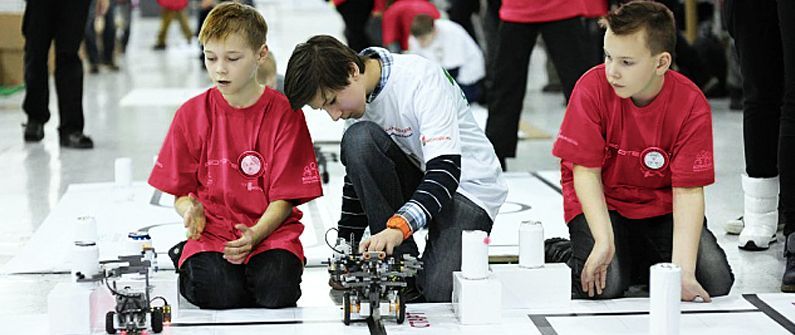
Next Generation Engineers
Volnoe Delo Oleg Deripaska Foundation implements a number of projects aimed to bring up future specialists for Russian industry starting from secondary school.
Volnoe Delo’s priorities in the field of engineering education:
- Early career guidance with the possibility to train skills at the production sites
- Popularization of science, technology and promotion of engineering careers among youth
- Development of problem-solving skills in engineering and technology
- Boosting schoolchildren’s interest for hi-tech and innovations
- Selection and support of talented youth
Among the Foundation’s projects aimed at development of engineering culture and bringing up the next generation’s engineers are the following:
- New Generation School
- School of Engineering Culture
- Robotics: Engineering Cadres of Innovative Russia
- Junior Skills
- Next Generation Blue-Collar Workers
New generation school
Basic Element’s companies have been involved in the programme since 2004. Currently it unites 38 schools in 14 Russian regions. It aims to bring up a new generation of students and teachers using up-to-date pedagogical techniques.
The main principle of the programme is that "Education goes on all the time a child is awake." The programme includes the promotion of search and research activity, respect for children’s behavior patterns and joint design and research work between teachers, students and their parents.
Communication among schools within the network of the New Generation School programme is supported by regional resource centers in Abakan, Krasnoyarsk, Nizhny Novgorod, Ust-Ilimsk, Ust-Labinsk, Chelyabinsk and Yaroslavl.
In 2008, Moscow school number 26 was the first school in the programme implemented model of full-time primary school, working on a holistic programme that combines and synchronizes primary and complementary education, all forms of classroom and extra-curricular activities, school and out-of-school activities.
In 2010 the school was given the status of a federal pilot site for 2010-2013.
School of engineering culture
A programme has been implemented since 2013. Its aim is to promote engineering as a profession among children, to form scientific and technological approach to studying the world through math, science, engineering disciplines, integration courses, design and research activity and through gaining real experience in research activity and design in various fields.
This project aims to change schoolchildren’s attitude to career and to help them form a proactive approach to life. School of engineering culture develops bright schoolchildren through universal engineering skills: research, management and project skills.
The programme lasts from primary to high school, and includes a system of interconnected classes in humanities, scientific disciplines, extracurricular and research activity. The basic principle of the programme is “Education through action”.
Professionals from various industries working in Basic Element companies help schoolchildren to solve the tasks.
Robotics: engineering cadres of innovative Russia
“Robotics: engineering cadres of innovative Russia” is a nationwide programme that has been implemented by Basic Element’s companies in cooperation with Russia’s Education ministry and Agency for Strategic Initiatives since 2008.This initiative is aimed at bringing up engineering cadres for Russian industry starting from primary school.
The programme is based on a system of robotics competitions on local, regional and nationwide levels. Over 20,000 children, teenagers and youth aged 8 to 25 from 63 Russian regions study mechatronics and programming in the resource centres established on the basis of schools, vocational colleges, technical schools and universities.
A key annual event of the Robotics programme is All-Russian Robotics Festival RoboFest that has been held in Moscow since 2009. The largest robotics festival in Europe, RoboFest draws the winners of the regional contests.
An annual competition among robotic vehicles RoboCross is also part of the Foundation’s Robotics programme. Russia has become the third country to organize RoboCross after the USA and Europe in 2010.
The winners of RoboFest and RoboCross represent Russia at the international robotics competition and participate in exchange programmes and internships in the USA, Europe and South Eastern Asia.
About 30% of the programme’s participants have been admitted to engineering faculties of technical universities since the inception of the programme.
Junior Skills
A programme on students’ early career guidance and professional training JuniorSkills was launched by Volnoe Delo Oleg Deripaska Foundation in 2014 together with the Agency of Strategic Initiatives, WorldSkills Russia, in cooperation with Russia’s Ministry of trade and Ministry of education.
JuniorSkills objective is to create new opportunities for career guidance and professional training for students.
The first pilot championship on professional skills JuniorSkills Hi-Tech was held in In Russia’s Urals city of Yekaterinburg in 2014 as part of the nationwide championship on cross-industry blue-collar professions in hi-tech WorldSkills.
The contest brought together 110 schoolchildren aged 10 to 17 in 53 teams, as well as 64 experts from eight Russian regions. The second national championship WorldSkills Hi-Tech took part in Yekaterinburg on October 30-November 3 in 2015. Among the participants were 116 schoolchildren aged 10 to 17 in 58 teams, as well as 80 mentors and experts from 17 Russian and Belarus regions.
Russian President Vladimir Putin acknowledged creation of JuniorSkills during his annual address to the Federal Assembly in 2014.JuniorSkills officially joined WorldSkills Russia in November 2014.
The first national JuniorSkills championship took place in Russia’s Kazan as a part of the bigger WorldSkills Russia contest on May 19-23 in 2015. A total of 100 schoolchildren aged 10-17 in 46 teams took part in JuniorSkills competition. The event was attended by 54 experts from 16 Russian regions.
In September 2015, JuniorSkills programme was added to the children’s complimentary education system.
It’s being currently negotiated to include JuniorSkills to the international WorldSkills competitions.
Next Generation Blue-Collar Workers
Volnoe Delo Oleg Deripaska Foundation with support of Basic Element group and Russian Union of Industrialists and Entrepreneurs has been implementing Next Generation Blue-Collar Workers programme since 2006. Its aim is to improve the quality of education for blue-collar workers and adapt them to the requirements of modern industrial enterprises.
A total of 18 vocational schools and colleges take part in the project that includes studying characteristics of regional industries, principles of lean production system and skill training at the plants.
People in charge of Basic Element’s industrial companies highly praise professional skills of the program’s participants. They admit that the next generation blue-collar workers do not need additional adaptation to the working conditions, they are familiar with modern technology and the methods of boosting efficiency at the plants.
Since the programme has proved successful, Basic Element is planning to create a replicable model of cooperation between industrial companies and educational institutions. It will significantly increase the programme’s scope.
Over 5,000 people have been involved in Next Generation Blue-Collar Workers programme since 2007.

